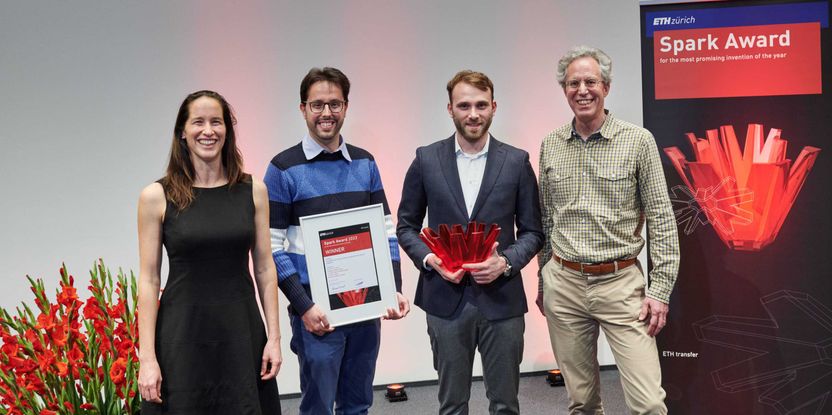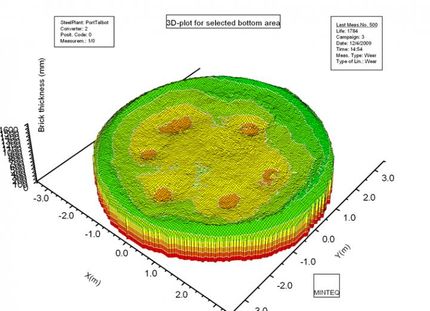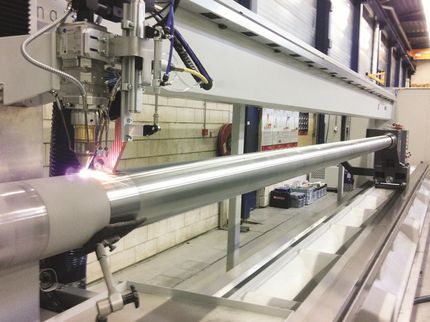Spark Award for new corrosion protection
Sprayed on like paint, this polymer can even be peeled off again, recycled and reused
More effective, reusable and self-repairing: a new kind of corrosion protection developed by the ETH researchers Marco D'Elia, Walter Caseri und Markus Niederberger has been honoured with ETH Zurich’s Spark Award 2023. The innovation offers excellent market potential and could significantly slow down the deterioration of buildings and vehicles.

Winners of the 2023 Spark Award (l-r): Walter Caseri, Marco D’Elia and Mirko Magni with Vanessa Wood, ETH’s Vice President for Knowledge Transfer and Corporate Relations.
Oliver Bartenschlager / ETH Zürich
This year, the expert jury immediately reached a unanimous decision: from among the five inventions nominated for the Spark Award 2023, the whole panel chose the novel corrosion protection developed by researchers from the Laboratory for Multifunctional Materials.
“This technology represents a critical improvement for corrosion protection and also advances the circular economy,” said Vanessa Wood, ETH Vice President for Knowledge Transfer and Corporate Relations, at the ward ceremony in the Audi Max. The material is reusable, can repair damaged areas itself and offers great market potential.
Surprised winners
With some 200 guests in attendance, Walter Caseri, Professor of Multifunctional Materials, along with Marco D’Elia and Mirko Magni accepted the Spark Award on behalf of the full five-strong research team. Unlike the jury, they had not expected to win – even though they have already received inquiries from industry and business.
The Spark Award is an additional incentive for them to develop their technology further. “The prize is not the end point for us, but a beginning,” explained Magni from the Università degli Studi di Milano, who complements the team of inventors at ETH Zurich together with Professor Stefano Trasatti. And Marco D’Elia added: “In dialogue with ETH transfer, we’ll now start taking the next steps to bring our technology to market.”
ETH transfer, the technology transfer office of ETH Zurich, supports entrepreneurs and has been recognising the university’s most promising innovation with the Spark Award every year since 2012. Last year alone, ETH Zurich applied for a total of 104 patents. Of those inventions, 20 had been shortlisted for the award and 5 made it through to the finals. The criteria for selecting the award winners are originality, patent strength and market potential.
Solving problems with innovation
Keynote speaker Carlo Centonze stressed how much effort it takes to turn a good idea into a successful product. Himself an ETH graduate, Centonze has already co-founded two ETH spin-offs: the climate protection organisation MyClimate in 2002, and then the company HeiQ, which specialises in innovative textiles, in 2005. “After founding MyClimate, I was forced to realise how difficult it is to change people's views,” Centonze explained. “Materials are much more flexible.”
That’s why the company he runs today develops, among other things, climate-friendly clothing with cellulose fibres made from agricultural waste. HeiQ is now so successful that it is the first ETH spin-off outside Switzerland to be traded on the London Stock Exchange.
According to Centonze, three things are crucial to the success of an innovation: One, the invention must solve an existing problem. Two, entrepreneurs have to have sufficient financial resources. And three, the rights to the innovation must be protected.
The winning technology
Strong corrosion protection: Corrosion attacks everything, from ships to skyscrapers. The market for effective corrosion protection is correspondingly large. Researchers led by Markus Niederberger and Walter Caseri have developed a plastic that greatly improves protection. Sprayed on like paint, this polymer can even be peeled off again, recycled and reused.
The finalists
A better view: Who hasn’t been annoyed when the lenses of their glasses fog up? Dimos Poulikakos and Thomas Schutzius, together with researchers from their groups, have now developed an ultra-thin transparent coating made of gold that converts sunlight into heat. In the future, this coating could prevent the lenses from fogging up and might even be used on the likes of car windows.
Smart clothing: Whether we’re exercising or performing physical tasks, exhaustion makes us more prone to injury. A group of researchers led by Carlo Menon has now developed an electronic yarn capable of precisely measuring body movements. The textile sensor can be integrated into sports or work clothing. It predicts the wearer’s physical exhaustion level and recommends breaks when they are nearing their limit.
Immune boosters against cancer: Immunotherapy against cancer has so far combined patients’ own killer cells with artificial protein complexes. More effective cells from healthy donors triggered too severe an immune response. Researchers led by Edo Kapetanovic and Sai Reddy have now modified donor cells in such a way that they can be tolerated by cancer patients and thus fight tumour cells more effectively.
More accurate rapid tests: Rapid tests are convenient, but the lines on the test strip aren’t always easy to interpret. Chih-Jen Shih and Andrew deMello have developed a rapid test system made of smart graphene paper. In addition to being more cost-effective, it is easy to use and as accurate as lab measurements. The test is also suitable for soil, air or water samples.
Other news from the department science
Most read news
More news from our other portals
Something is happening in the chemical industry ...
This is what true pioneering spirit looks like: Plenty of innovative start-ups are bringing fresh ideas, lifeblood and entrepreneurial spirit to change tomorrow's world for the better. Immerse yourself in the world of these young companies and take the opportunity to get in touch with the founders.






























































